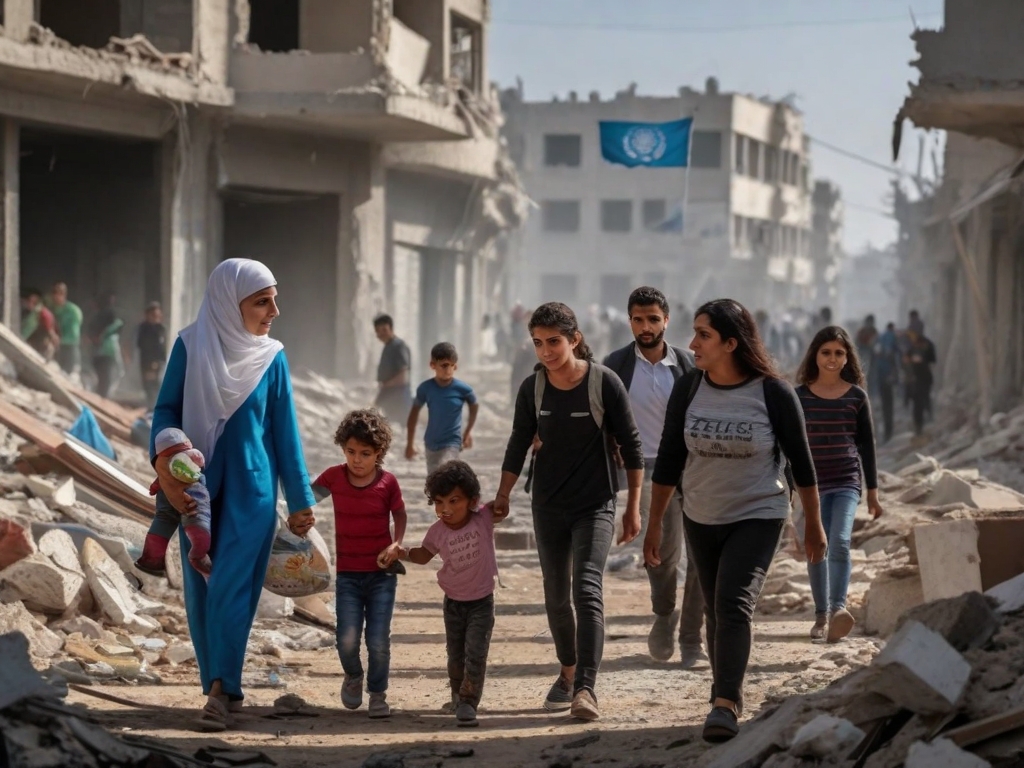Palestine
Between Attacks and Hope: Humanitarian Consequences – 6 –
6. Humanitarian Consequences
The persistent conflict between Israel and Palestine has unveiled a number of humanitarian challenges in Gaza and the Palestinian territories. The situation, severely exacerbated by human casualties and infrastructure damage, underscores the urgency of international interventions to mitigate the humanitarian consequences. This article analyzes the humanitarian consequences of the conflict, exploring the various dimensions of the crisis and the global response to it.
Human Losses: A Devastating Tribute.
Bitter Count
The conflict has seen historic human casualties, often with civilians caught in the crossfire. The United Nations Office for the Coordination of Humanitarian Affairs (OCHA) has been monitoring fatalities since 2008, recording an increasing escalation of violence. In particular, a recent spate of violence highlighted one of the deadliest weeks between Israeli military forces and Palestinian armed groups in Gaza.
Massive Displacements
The displacements caused by the conflict have further aggravated the humanitarian situation. Displaced families have sought refuge in schools, mosques, or with family and friends, often facing precarious living conditions.
Infrastructure Damage: A Strike at the Heart of Gaza and Palestine.
Bombing and Destruction
The Gaza Strip suffered widespread damage to schools, hospitals and other essential infrastructure as a result of the shelling. This situation has caused nearly one million people to be displaced, with humanitarian agencies reporting a “catastrophic” shortage of medical supplies in the besieged territory.
Long-Term Repercussions
Infrastructure damage not only has immediate effects, but is also a significant obstacle to long-term recovery. Reconstruction will take substantial time and resources, straining the already limited resources of Gaza and Palestine.
Health Effects: A System on the Edge
Health Crisis
The growing crisis is straining an already overburdened global humanitarian system. Immediate health concerns for civilians in the Gaza Strip relate to access to medical care, with a severe shortage of blood and medicine. This situation is aggravated by the shortage of medical personnel and the damage done to health care facilities.
Access to Medical Care: A Right Denied
Direct attacks caused damage to 24 health facilities, including six hospitals. In addition, 15 health workers were killed, 27 others were injured, and 23 ambulances were damaged, according to the World Health Organization (WHO). Hospitals in Gaza are facing a “catastrophic” shortage of medical supplies, with medical staff struggling to keep essential services running despite the lack of electricity, fuel and essential medical supplies.
Refugee Crisis: A Forced Exodus and Humanitarian Consequences.
Displacement and Search for Shelter
The refugee crisis continues to worsen, with increasing numbers of displaced people seeking refuge in schools, mosques or with family and friends. The conflict has also disrupted access to essential services, such as food, water and health care, further exacerbating the humanitarian situation in the region.
Future Challenges
Precarious living conditions, coupled with lack of access to essential services, pose an ongoing humanitarian challenge. The international community must address these challenges to ensure a more stable and secure future for refugees to mitigate the humanitarian consequences.
International Response: A Call for Global Solidarity
Humanitarian Aid
For 50 years, the International Committee of the Red Cross (ICRC) has sought to fulfill its humanitarian mission in Israel and the occupied Palestinian territories, assisting and protecting populations on both sides of the conflict. The international humanitarian response also includes financial assistance, although the UN agency assisting the Palestinian people, UNRWA, is facing a severe financial crisis.
Call to Cease Fire
The international community has responded with humanitarian aid and calls for a cease-fire and a political solution. However, humanitarian access remains a significant problem, with restrictions on the entry of medical supplies and other essential goods.
Conclusions: Reflections on the Humanitarian Consequences on Gaza and Palestine.
The humanitarian consequences resulting from the conflict between Israel and Palestine are manifestly severe and long-lasting, particularly in the densely populated areas of Gaza and the surrounding Palestinian territories. Loss of life, damage to vital infrastructure, the ongoing health crisis, and the refugee situation are preponderant challenges that highlight the urgent need for internationally coordinated humanitarian and policy interventions.
The situation in Gaza and Palestine requires a substantial and well-coordinated humanitarian response to alleviate suffering and work toward a lasting solution to the conflict. Humanitarian initiatives in response to the crises in Gaza and Palestine have provided vital support, but the road to a peaceful and sustainable resolution remains long.
International efforts must continue to focus on providing much-needed humanitarian assistance to Gaza and Palestine, as well as working toward a political solution that can bring lasting peace to the region. Only through concerted and sustained efforts can the severe humanitarian consequences of the conflict be mitigated, thus enabling Gaza and Palestine to move toward a more stable and prosperous future.
<< International Interventions Future Perspectives >>


